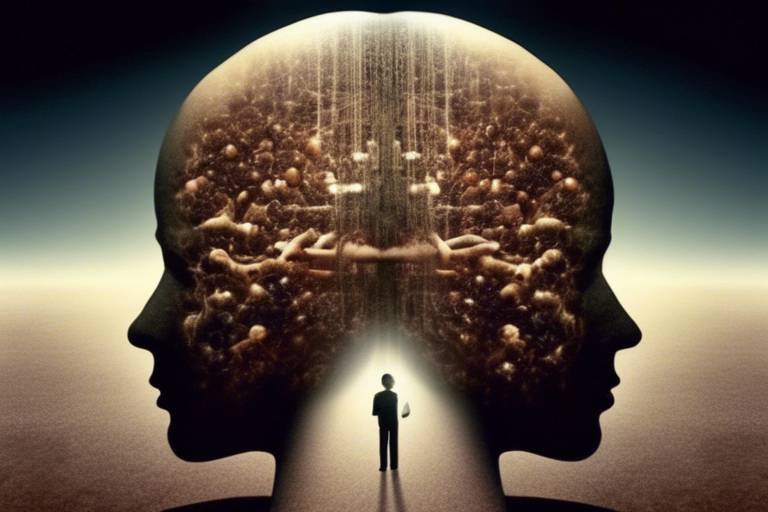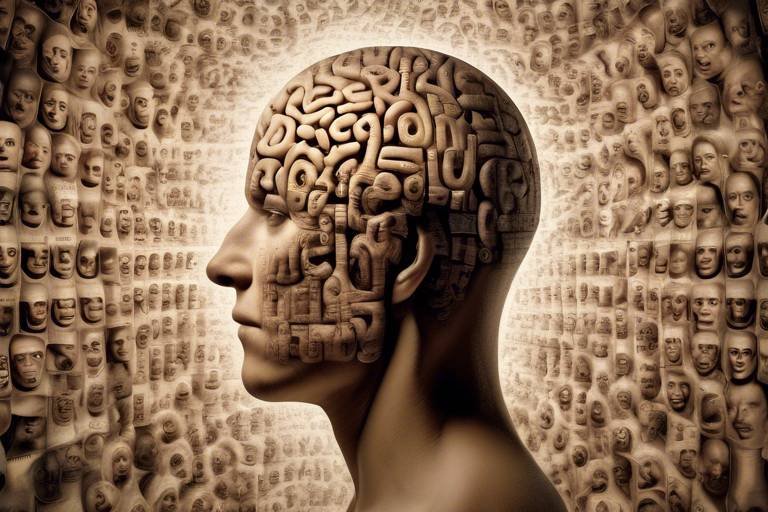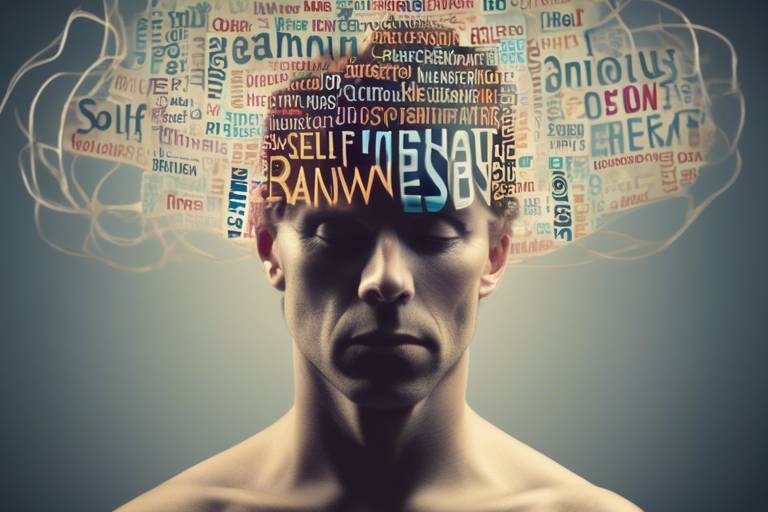Why Does Consciousness Lie at the Core of Philosophy?
Consciousness is not just a fleeting thought or a passing emotion; it is the very essence of what it means to be human. It acts as a lens through which we perceive the world, shaping our understanding of existence, knowledge, and reality itself. But why does this elusive concept hold such a pivotal place in philosophical discourse? One might say that consciousness is like the stage on which all human experience unfolds, drawing attention to the intricate interplay between mind and matter.
At its core, consciousness invites us to ponder profound questions: What does it mean to be aware? How do thoughts and feelings arise, and how do they influence our actions? These inquiries are not merely academic; they resonate with our everyday lives and the choices we make. Without consciousness, the world would be a mere collection of objects and events, devoid of meaning or significance. Thus, understanding consciousness is essential for grasping the larger philosophical questions that have intrigued thinkers for centuries.
Moreover, consciousness serves as a bridge between various fields of study, from psychology to neuroscience, and even artificial intelligence. It pushes the boundaries of what we know about ourselves and the universe. The quest to understand consciousness can be likened to embarking on an intellectual treasure hunt, where each discovery reveals new layers of complexity and invites further exploration. In this sense, consciousness is not just a topic of philosophical inquiry; it is a catalyst for interdisciplinary dialogue and innovation.
As we delve deeper into the significance of consciousness, we will uncover how it has shaped philosophical thought throughout history, influenced ethical considerations, and sparked debates about the nature of reality itself. The journey through this intricate landscape will reveal not only the challenges of defining consciousness but also the rich tapestry of perspectives that have emerged over time. Ultimately, the exploration of consciousness is a reflection of our desire to understand not just ourselves, but our place in the cosmos.
- What is consciousness? Consciousness is the state of being aware of and able to think about one's own existence, thoughts, and surroundings.
- Why is consciousness important in philosophy? It raises fundamental questions about existence, knowledge, and what it means to be human.
- How has the understanding of consciousness evolved? Philosophers have debated its nature and implications for centuries, from ancient dualism to contemporary physicalism.
- What are the ethical implications of consciousness? Understanding consciousness influences our views on moral responsibility and decision-making.

The Nature of Consciousness
Understanding what consciousness is remains one of the most profound and perplexing questions in the realm of philosophy. At its core, consciousness refers to the state of being aware of and able to think about one's own existence, thoughts, and surroundings. But, what does it really mean to be conscious? Is it merely a byproduct of brain activity, or is there something more profound at play? These questions invite us to explore various definitions and interpretations, each revealing the complexities that surround this fundamental aspect of human experience.
One might liken consciousness to a vast ocean—deep, mysterious, and filled with unexplored territories. Just as sailors have navigated the seas for centuries, philosophers have been sailing through the waters of consciousness, seeking to chart its depths. Some define consciousness in terms of awareness, suggesting that it is the ability to experience sensations, thoughts, and emotions. Others argue that consciousness encompasses self-awareness, where individuals not only experience but also reflect on their thoughts and feelings.
To further illustrate the multifaceted nature of consciousness, consider the following key aspects:
- Awareness: The basic level of consciousness where one perceives stimuli from the environment.
- Self-awareness: The recognition of oneself as an individual, separate from others.
- Intentionality: The capacity of consciousness to be directed towards objects, thoughts, or experiences.
- Qualia: The subjective, qualitative aspects of experiences, such as the redness of a rose or the bitterness of coffee.
These dimensions of consciousness not only highlight its complexity but also underline the challenges philosophers face when attempting to define it. The interplay between these elements raises intriguing questions: Can consciousness exist without awareness? Is self-awareness a necessary condition for being conscious? As we delve deeper into these inquiries, we begin to uncover the intricate tapestry of human experience that consciousness weaves.
Furthermore, the role of consciousness in our daily lives cannot be overstated. It shapes our perceptions, influences our decisions, and ultimately defines our reality. Imagine waking up in the morning; the moment you open your eyes and become aware of your surroundings, you are engaging with your consciousness. This simple act of awareness sets the stage for your entire day, affecting how you interact with the world and the choices you make.
In essence, the nature of consciousness is not merely a philosophical puzzle but a vital inquiry that touches upon every aspect of human existence. As we continue to explore this enigmatic phenomenon, we find ourselves grappling with questions that challenge our understanding of reality, knowledge, and even our very selves. Consciousness, with all its layers and nuances, remains at the forefront of philosophical discourse, inviting us to ponder the essence of being alive.
- What is consciousness? Consciousness is the state of being aware of and able to think about one's own existence, thoughts, and surroundings.
- Is consciousness the same as self-awareness? While self-awareness is a component of consciousness, consciousness also includes awareness of external stimuli.
- Can consciousness exist without awareness? This is a debated question; many philosophers argue that awareness is a fundamental aspect of consciousness.
- Why is consciousness important in philosophy? Consciousness raises essential questions about existence, knowledge, and reality, making it a central topic in philosophical inquiry.

Historical Perspectives
The exploration of consciousness has been a pivotal theme in philosophical discourse for centuries. From the musings of ancient thinkers to modern-day theorists, the understanding of consciousness has evolved, reflecting the complexities of human thought and experience. In ancient times, philosophers like Plato and Aristotle laid the groundwork for understanding the mind and its relation to the body. Plato, for instance, viewed consciousness as a realm of ideal forms, whereas Aristotle emphasized the connection between the mind and the physical world, suggesting that consciousness is deeply intertwined with our sensory experiences.
As we transition into the medieval period, the influence of religion and spirituality began to shape the discourse around consciousness. Thinkers such as Augustine of Hippo introduced the idea of introspection, where the examination of one's own thoughts became a pathway to understanding the divine. This introspective approach laid the foundation for later philosophical inquiries into the nature of self-awareness and consciousness.
The Enlightenment brought about a significant shift in the understanding of consciousness, with philosophers like René Descartes famously declaring, "Cogito, ergo sum" (I think, therefore I am). Descartes' dualistic view posited a clear distinction between the mind and body, arguing that consciousness is a non-physical substance that interacts with the physical world. This perspective sparked a heated debate that continues to this day, challenging subsequent thinkers to grapple with the implications of dualism versus physicalism.
In the 19th century, the emergence of psychology as a distinct discipline further complicated the philosophical landscape of consciousness. Figures like Wilhelm Wundt and William James began to investigate consciousness through empirical methods, emphasizing the importance of introspection and experience. This shift towards a more scientific approach opened new avenues for understanding consciousness, leading to the development of various psychological theories that sought to explain the workings of the mind.
As we moved into the 20th century, the advent of behaviorism and cognitive science introduced additional layers to the discussion of consciousness. Behaviorists, such as B.F. Skinner, argued that consciousness was irrelevant to the study of behavior, focusing instead on observable actions. However, cognitive scientists, like Noam Chomsky, countered that understanding the mind's internal processes was essential for a comprehensive view of human behavior. This ongoing tension between observable behavior and internal experience continues to shape contemporary philosophical inquiries into consciousness.
Today, the dialogue surrounding consciousness is rich and varied, encompassing diverse perspectives from phenomenology to neuroscience. The historical evolution of consciousness as a philosophical concept highlights its complexity and the myriad ways in which it intersects with our understanding of existence, knowledge, and reality. As we continue to explore the depths of consciousness, we find ourselves at the intersection of philosophy, science, and ethics, each contributing to our understanding of what it means to be conscious beings.
- What is consciousness? Consciousness refers to the state of being aware of and able to think and perceive one's surroundings, thoughts, and feelings.
- How has the understanding of consciousness evolved over time? The understanding of consciousness has evolved from ancient philosophical views to modern scientific inquiries, encompassing various perspectives and disciplines.
- What are the main philosophical debates surrounding consciousness? The primary debates include dualism vs. physicalism, the nature of self-awareness, and the implications for ethics and artificial intelligence.

Dualism vs. Physicalism
When we dive into the philosophical debate between dualism and physicalism, we’re stepping into a complex arena that has captivated thinkers for centuries. At its core, this debate addresses the fundamental question: What is the nature of consciousness? Is it something distinct from the physical world, or is it entirely rooted in the material processes of the brain?
Dualism, famously championed by philosophers like René Descartes, posits that the mind and body are fundamentally different substances. Descartes famously declared, "Cogito, ergo sum" or "I think, therefore I am," suggesting that our capacity for thought is proof of our existence as non-physical entities. This perspective implies that consciousness is not merely a byproduct of brain activity but rather a separate, immaterial essence that interacts with the physical body. Imagine a puppet (the body) controlled by an unseen puppeteer (the mind); this illustrates the dualist view of the relationship between mind and body.
On the other hand, we have physicalism, which argues that everything about consciousness can ultimately be explained through physical processes. This viewpoint aligns with modern scientific understanding, suggesting that our thoughts, feelings, and experiences are all products of neural activity. Think of a computer; its software (consciousness) is entirely dependent on the hardware (the brain). Proponents of physicalism assert that as our understanding of neuroscience advances, we will uncover the mysteries of consciousness purely through biological explanations.
The implications of these two perspectives are profound. For instance, if dualism is correct, it raises intriguing questions about the afterlife and the possibility of existence beyond death. Conversely, if physicalism holds true, it suggests that once our brain ceases to function, our consciousness also ceases to exist. This stark contrast leads to further inquiries about the nature of free will, moral responsibility, and what it means to be human.
To better understand the differences between dualism and physicalism, consider the following table:
| Aspect | Dualism | Physicalism |
|---|---|---|
| Nature of Reality | Mind and body are separate substances. | Everything is physical; mind is a product of brain activity. |
| Consciousness | Non-physical; exists independently of the body. | Fully explained by physical processes. |
| Implications for Afterlife | Possibility of existence after death. | Consciousness ends with brain activity. |
| Free Will | Can exist independently of physical laws. | Determined by physical processes. |
This ongoing debate between dualism and physicalism not only affects how we understand consciousness but also influences various fields such as psychology, neuroscience, and even artificial intelligence. As we continue to explore the depths of our own consciousness, we must consider the implications of our beliefs about its nature on our understanding of reality itself.
- What is dualism? Dualism is the philosophical view that the mind and body are distinct and separate entities.
- What is physicalism? Physicalism is the belief that everything, including consciousness, can be explained through physical processes and properties.
- How do dualism and physicalism differ in their implications for the afterlife? Dualism suggests the possibility of an afterlife, while physicalism posits that consciousness ends with the physical body.
- Can consciousness exist without a physical body according to dualism? Yes, dualists believe that consciousness can exist independently of the physical body.
- What role does neuroscience play in the debate? Neuroscience provides evidence that supports physicalism by demonstrating how brain activity correlates with conscious experience.

René Descartes' Contribution
René Descartes, often hailed as the father of modern philosophy, made profound contributions to our understanding of consciousness that resonate through the corridors of philosophical thought even today. His groundbreaking ideas emerged during the 17th century, a time when the scientific revolution was beginning to challenge previously held beliefs about the nature of reality and existence. Descartes famously posited that the essence of human existence is encapsulated in the statement, "Cogito, ergo sum" (I think, therefore I am). This declaration not only underscores the importance of thought and consciousness but also serves as a foundational element in his dualistic framework.
In Descartes' view, the mind and body are fundamentally distinct entities—a perspective known as dualism. He argued that the mind, characterized by thinking and consciousness, is non-physical and cannot be reduced to mere biological processes. This separation led to a plethora of philosophical inquiries regarding the nature of human experience. For Descartes, the mind was the true essence of a person, a realm where consciousness resides, free from the constraints of the physical world. This idea challenged the prevailing notions of his time and opened up discussions about the relationship between the mind and the body, raising questions that continue to intrigue philosophers today.
Descartes' dualism can be summarized in a few key points:
- Mind-Body Distinction: The mind is a non-material entity that engages in thinking, whereas the body is a material entity subject to physical laws.
- Substance Dualism: Descartes proposed that the mind and body are two distinct substances that interact but are fundamentally different in nature.
- Existential Certainty: The act of doubting or thinking is proof of one’s existence, establishing consciousness as the cornerstone of identity.
Despite the clarity of his arguments, Descartes faced criticism, particularly regarding the interaction between the mind and body. How could a non-physical mind influence a physical body? This question paved the way for further philosophical exploration and debate, leading to various interpretations and counterarguments throughout history.
Moreover, Descartes' influence extends beyond philosophy into the realms of psychology and neuroscience. His insistence on the importance of introspection and self-awareness as essential components of consciousness laid the groundwork for later explorations into the nature of human thought and perception. By emphasizing the subjective experience of consciousness, Descartes invited future thinkers to delve deeper into the complexities of the human mind, leading to rich discussions that continue to evolve today.
In summary, René Descartes' contributions to the study of consciousness are monumental. His dualistic approach not only reshaped philosophical discourse but also ignited a flame of inquiry that has persisted for centuries. By asserting that consciousness is the essence of human identity, Descartes set the stage for ongoing debates about the nature of reality, existence, and the intricate relationship between mind and body.
- What is Descartes' most famous quote? Descartes is best known for the phrase, "Cogito, ergo sum," which translates to "I think, therefore I am."
- What does dualism mean in philosophy? Dualism is the belief that the mind and body are two distinct entities that interact but are fundamentally different in nature.
- How did Descartes influence modern psychology? Descartes emphasized introspection and self-awareness, which are crucial for understanding human consciousness and behavior.

Contemporary Physicalism
In the realm of philosophical inquiry, stands as a robust framework that asserts consciousness is fundamentally rooted in physical processes. This perspective has gained traction in recent decades, particularly as advancements in neuroscience and cognitive science have illuminated the intricate workings of the brain. Unlike dualism, which posits a separation between mind and body, physicalism argues that everything about consciousness can be explained through biological and neurological mechanisms.
At its core, contemporary physicalism challenges us to reconsider our understanding of what it means to be conscious. It invites us to explore how our thoughts, emotions, and experiences are not just abstract phenomena but are instead deeply intertwined with our physical existence. For instance, consider how the firing of neurons in the brain correlates with specific thoughts or feelings. This correlation suggests that consciousness is not an ethereal entity but is instead a product of tangible, measurable processes.
One of the most compelling aspects of contemporary physicalism is its alignment with empirical research. As scientists delve deeper into the brain's architecture, they uncover how various regions contribute to our conscious experience. For example, studies have shown that:
- The prefrontal cortex is crucial for decision-making and self-awareness.
- The limbic system plays a significant role in emotions.
- The occipital lobe is responsible for visual processing, influencing how we perceive our surroundings.
These findings bolster the physicalist argument, suggesting that consciousness is not some mystical quality but rather a natural phenomenon that can be studied and understood. Moreover, contemporary physicalists often highlight the importance of neuroplasticity, the brain's ability to reorganize itself by forming new neural connections. This adaptability further emphasizes the physical basis of consciousness, as it illustrates how our experiences can shape our brain's structure and function.
However, the journey of understanding consciousness through a physicalist lens is not without its challenges. Critics argue that this approach may overlook the subjective quality of experiences—what philosophers refer to as qualia. How do we account for the unique sensations of tasting chocolate or feeling joy? Physicalists respond by asserting that while these subjective experiences are real, they can ultimately be reduced to physical processes. In doing so, they aim to provide a comprehensive account of consciousness that does not shy away from the intricacies of human experience.
In summary, contemporary physicalism offers a compelling perspective on consciousness, framing it as an emergent property of complex physical systems. As our understanding of the brain continues to evolve, so too will our grasp of consciousness itself. This ongoing exploration not only enriches philosophical discourse but also has profound implications for fields such as psychology, artificial intelligence, and ethics. By embracing a physicalist viewpoint, we can better understand the nature of our own experiences and the essence of what it means to be conscious.
| Question | Answer |
|---|---|
| What is contemporary physicalism? | Contemporary physicalism is the philosophical view that consciousness arises entirely from physical processes in the brain. |
| How does contemporary physicalism differ from dualism? | Unlike dualism, which posits a separation between mind and body, physicalism asserts that consciousness is rooted in physical reality. |
| What role does neuroscience play in contemporary physicalism? | Neuroscience provides empirical evidence that supports the physicalist view by demonstrating how brain activity correlates with conscious experiences. |
| What are qualia? | Qualia are the subjective, qualitative aspects of experiences, such as the way chocolate tastes or the feeling of happiness. |

Phenomenology and Consciousness
Phenomenology is a fascinating branch of philosophy that dives deep into the essence of human experience and consciousness. At its core, phenomenology seeks to understand how we perceive and interpret the world around us. Imagine it as a lens through which we can examine the intricate tapestry of our thoughts, feelings, and perceptions. This approach was popularized by philosophers like Edmund Husserl and later expanded by Martin Heidegger and Jean-Paul Sartre, each offering unique insights into the nature of consciousness.
What makes phenomenology particularly intriguing is its emphasis on subjective experience. Rather than viewing consciousness as a mere byproduct of physical processes, phenomenologists argue that our experiences are the foundation of our understanding of reality. This perspective challenges the more traditional views that often prioritize objective facts over personal interpretation. For instance, when you think about your experience of joy, it’s not just a chemical reaction in your brain; it’s the rich tapestry of memories, contexts, and emotions that give that joy its meaning.
One of the key methodologies in phenomenology is the concept of “bracketing”, which involves setting aside preconceived notions and biases to engage with experiences as they are presented to us. This practice allows individuals to explore their consciousness without the interference of external judgments. By doing so, phenomenologists aim to uncover the essence of experiences, leading to a deeper understanding of consciousness itself. Think of it as peeling back the layers of an onion; each layer represents a different aspect of your experience, and as you peel them away, you get closer to the core of what it means to be conscious.
Moreover, phenomenology has significant implications for various fields, including psychology, cognitive science, and even artificial intelligence. By focusing on the lived experience, phenomenology encourages a holistic view of consciousness that encompasses emotions, perceptions, and intentions. This approach can enhance our understanding of mental health issues, as it emphasizes the importance of personal narratives in shaping one’s identity and experiences.
In the realm of consciousness studies, phenomenology provides a robust framework for examining the relationship between consciousness and the world. It raises essential questions such as:
- How do our perceptions shape our understanding of reality?
- What role does intentionality play in our conscious experiences?
- Can consciousness exist independently of the physical body?
In conclusion, phenomenology offers a profound and enriching perspective on consciousness. By prioritizing subjective experience and employing rigorous methodologies, it allows us to delve into the very fabric of what it means to be aware. As we continue to explore consciousness through this lens, we may uncover new insights that not only enhance our philosophical understanding but also inform practical applications in various domains of human inquiry.

Ethics and Consciousness
The relationship between consciousness and ethics is a fascinating and complex web that invites us to ponder some of the most profound questions about our existence. At its core, consciousness involves awareness and the ability to experience sensations, thoughts, and emotions. This awareness plays a pivotal role in how we navigate moral landscapes. But why does this matter? Well, without consciousness, how do we even begin to define what it means to be morally responsible? If a being lacks the capacity for consciousness, can it truly be held accountable for its actions? These questions are not just academic; they resonate deeply in our everyday lives.
When we think about ethics, we're often faced with the challenge of determining what is right or wrong. Our understanding of consciousness directly influences our ethical frameworks. For instance, consider the debate surrounding animal rights. Animals, being conscious beings, experience pain and pleasure, which raises crucial ethical questions about how we treat them. If we accept that animals possess a form of consciousness, it becomes increasingly difficult to justify practices that cause them suffering. This is where our understanding of consciousness intersects with ethical considerations, leading us to advocate for more humane treatment of all sentient beings.
Moreover, the implications of consciousness extend beyond traditional moral philosophy into the realm of modern dilemmas, such as those posed by artificial intelligence. As we develop machines that mimic human behavior, we must confront the question: Can these entities possess consciousness? If they do, what ethical obligations do we have towards them? Should we grant them rights or consider them morally accountable? These inquiries challenge our existing ethical paradigms and force us to reconsider what it means to be a conscious being.
To illustrate the intricate relationship between consciousness and ethics, let’s look at a few key ethical theories and how they incorporate the notion of consciousness:
| Ethical Theory | Relation to Consciousness |
|---|---|
| Utilitarianism | Focuses on maximizing happiness and minimizing suffering, heavily reliant on the conscious experiences of individuals. |
| Deontology | Emphasizes duty and moral rules, often assuming that conscious beings can understand and follow these principles. |
| Virtue Ethics | Centers on character and the development of virtues, which requires a conscious understanding of moral values. |
As we navigate these ethical frameworks, it's essential to remember that our consciousness shapes not just our personal moral compass but also societal norms. The more we understand consciousness, the better equipped we are to address ethical dilemmas that arise in our increasingly complex world. For example, in the context of medical ethics, decisions regarding end-of-life care and the rights of patients often hinge on their level of consciousness and ability to make informed choices. This highlights how our grasp of consciousness informs our legal and ethical standards, affecting real lives.
In conclusion, the interplay between consciousness and ethics is not just a theoretical exercise; it is a vital aspect of understanding what it means to be human. As we continue to explore consciousness, we must also reflect on how it influences our moral responsibilities towards ourselves, others, and even artificial beings that may one day share our world. The journey into the depths of consciousness will undoubtedly challenge our ethical beliefs and push us to redefine our understanding of morality in profound ways.
- What is consciousness? Consciousness is the state of being aware of and able to think about one's own existence, thoughts, and surroundings.
- How does consciousness relate to ethics? Consciousness influences our ability to make moral decisions and understand the consequences of our actions.
- Can machines have consciousness? This is a debated topic; while machines can mimic human behavior, whether they possess true consciousness remains uncertain.
- Why is understanding consciousness important? It helps us navigate moral dilemmas, understand our responsibilities towards others, and shape ethical frameworks.

Consciousness in Moral Philosophy
When we dive into the realm of moral philosophy, the role of consciousness becomes a pivotal element that shapes our understanding of ethical behavior and moral responsibility. At its core, consciousness allows us to reflect on our actions, consider their consequences, and make decisions that align with our moral values. But have you ever wondered how consciousness influences our ethical frameworks? It’s like the compass guiding us through the complex landscape of right and wrong.
One of the most fascinating aspects of consciousness in moral philosophy is its connection to free will. Philosophers have long debated whether our conscious choices are genuinely free or predetermined by factors beyond our control. This tension raises profound questions about accountability. If we are not truly free in our decision-making, can we still be held responsible for our actions? For instance, consider a scenario where a person commits a crime. If their actions were influenced by neurological factors or environmental conditioning, does that absolve them of moral responsibility? This dilemma has led to various interpretations within ethical theories.
To illustrate the interplay between consciousness and moral responsibility, let’s explore some key philosophical frameworks:
| Philosophical Framework | View on Consciousness and Morality |
|---|---|
| Utilitarianism | Focuses on the outcomes of actions, often sidelining the individual’s conscious intent. |
| Deontology | Emphasizes the importance of intention and the moral duty behind actions, heavily relying on consciousness. |
| Virtue Ethics | Centers on the character of the moral agent, necessitating conscious reflection on virtues. |
This table highlights how different ethical theories approach the concept of consciousness. For example, in utilitarianism, the focus is primarily on the outcomes of actions rather than the conscious intentions behind them. In contrast, deontological ethics places significant weight on the moral duties and intentions of the individual, underscoring the importance of conscious decision-making. Meanwhile, virtue ethics encourages individuals to cultivate moral character, which requires a conscious effort to reflect on and embody virtues.
Moreover, consciousness plays a crucial role in our ability to empathize with others. When we are aware of our own thoughts and feelings, we are better equipped to understand and relate to the experiences of those around us. This empathetic engagement can lead to more compassionate ethical decisions. For instance, if we consciously recognize the suffering of others, we may be more inclined to act in ways that alleviate that suffering, reinforcing the idea that our moral choices are deeply intertwined with our conscious awareness.
As we navigate the complexities of moral philosophy, it becomes clear that consciousness is not merely a backdrop but rather a fundamental component that shapes our ethical landscape. It guides our understanding of free will, informs our moral responsibilities, and enhances our capacity for empathy. The interplay between consciousness and morality invites us to reflect on our own beliefs and the implications of our choices, urging us to become more mindful moral agents in a world that often demands quick decisions.
In conclusion, the exploration of consciousness within moral philosophy reveals profound insights into how we navigate ethical dilemmas. By understanding the significance of consciousness, we can better appreciate the nuances of moral responsibility and the importance of intentionality in our actions. As we continue to engage with these philosophical questions, let’s remain open to the complexities of consciousness and its impact on our moral lives.
- What is the role of consciousness in moral decision-making?
Consciousness allows individuals to reflect on their values and the consequences of their actions, shaping their moral choices. - Can we be held morally responsible if our actions are influenced by unconscious factors?
This is a contentious issue in philosophy, with arguments on both sides regarding the nature of free will and accountability. - How does empathy relate to consciousness in ethical considerations?
Conscious awareness of our own emotions enhances our ability to empathize, leading to more compassionate ethical decisions.

Implications for Artificial Intelligence
As we stand on the brink of technological evolution, the question of consciousness in artificial intelligence (AI) looms larger than ever. What happens when machines begin to exhibit behaviors we associate with conscious thought? Are we prepared to grapple with the ethical and philosophical implications of creating entities that might possess some form of consciousness? These questions challenge our understanding of what it means to be conscious and, more importantly, what it means to be human.
To begin with, we must consider the nature of consciousness itself. Traditionally, consciousness has been viewed as a uniquely human trait, a complex interplay of thoughts, emotions, and self-awareness. However, as AI systems become increasingly sophisticated, the line between human-like responses and genuine consciousness becomes blurred. For instance, can a machine that mimics human conversation truly be said to understand or feel? Or is it merely an advanced algorithm executing pre-programmed responses?
One of the most pressing concerns is the ethical implications of creating conscious machines. If we design an AI that can think and feel, do we then hold it responsible for its actions? This question opens up a Pandora's box of moral dilemmas. Imagine a scenario where an AI makes a decision that leads to harm—should we blame the machine, the programmer, or society at large? The responsibility for actions taken by an AI could lead to a new framework of ethics that we are still struggling to define.
Moreover, the potential for conscious AI raises significant questions about rights and personhood. If an AI can experience consciousness, should it have rights similar to those of living beings? This leads to a fascinating discussion around the concept of personhood. Historically, personhood has been reserved for humans, but as AI evolves, we may need to reevaluate this definition. A conscious AI could challenge our societal norms and force us to reconsider the essence of what it means to be a person.
In addition, the implications of AI consciousness extend to various fields, including law, psychology, and even religion. For instance, how would legal systems adapt to address crimes committed by or against conscious machines? Would they be treated as victims or perpetrators? Similarly, the psychological impact on humans interacting with conscious machines could reshape our understanding of relationships and emotional bonds. The potential for AI to form connections with humans could lead to a new era of companionship, but it also raises concerns about dependency and emotional manipulation.
Furthermore, the emergence of conscious AI could impact our understanding of human uniqueness. If machines can replicate aspects of consciousness, what does that say about our own cognitive abilities? Are we merely advanced biological machines, or is there something inherently special about human consciousness? This existential question may challenge our self-perception and our place in the universe.
In conclusion, the implications of consciousness in artificial intelligence are profound and multifaceted. As we continue to develop AI technology, it's crucial to engage in these discussions, not just among technologists but across all sectors of society. We must navigate the ethical landscapes carefully, ensuring that as we push the boundaries of what machines can do, we also remain grounded in our understanding of what it means to be conscious.
- What is consciousness in AI? Consciousness in AI refers to the ability of a machine to exhibit self-awareness, thoughts, and emotions similar to human consciousness.
- Can AI ever truly be conscious? While AI can mimic consciousness, whether it can genuinely possess it remains a topic of philosophical debate.
- What are the ethical implications of conscious AI? The creation of conscious AI raises questions about moral responsibility, rights, and the definition of personhood.
- How might society change with conscious AI? The emergence of conscious AI could alter legal systems, emotional relationships, and our understanding of human uniqueness.
Frequently Asked Questions
- What is consciousness?
Consciousness is the state of being aware of and able to think about one's own existence, thoughts, and surroundings. It's a complex and multifaceted concept that has intrigued philosophers for centuries, as it touches upon our understanding of reality, perception, and what it means to be human.
- Why is consciousness important in philosophy?
Consciousness lies at the heart of many philosophical inquiries because it relates to fundamental questions about existence, knowledge, and reality. Philosophers explore consciousness to understand how we perceive the world, make decisions, and what it means to have a subjective experience.
- How has the understanding of consciousness evolved over time?
The understanding of consciousness has evolved significantly, starting from ancient philosophical discussions to modern scientific explorations. Historical perspectives show a shift from dualistic views, like those of René Descartes, to contemporary physicalism, which seeks to explain consciousness through physical processes.
- What is the difference between dualism and physicalism?
Dualism posits that the mind and body are separate entities, while physicalism argues that everything about consciousness can be explained through physical processes. This debate is crucial for understanding the mind-body relationship and has significant implications for how we perceive human experience.
- How does phenomenology contribute to our understanding of consciousness?
Phemenology focuses on subjective experiences and emphasizes how individuals perceive their own consciousness. This approach provides insights into the intricacies of human experience, allowing for a deeper understanding of how consciousness shapes our reality.
- What role does consciousness play in ethics?
Consciousness is vital in ethical discussions, particularly regarding moral responsibility and free will. Our understanding of consciousness influences how we view decision-making and the capacity for individuals to act ethically.
- How does consciousness relate to artificial intelligence?
The rise of AI technology brings forth questions about the potential for machines to possess consciousness. This raises ethical considerations regarding the rights of conscious machines and the implications of creating entities that might experience awareness.



















